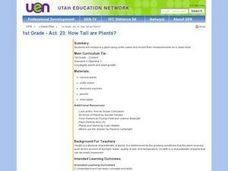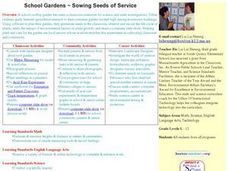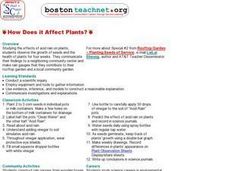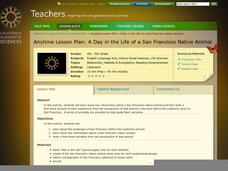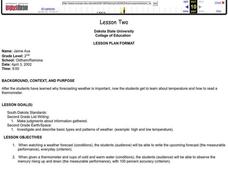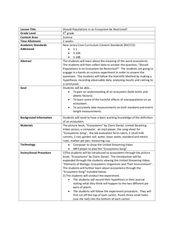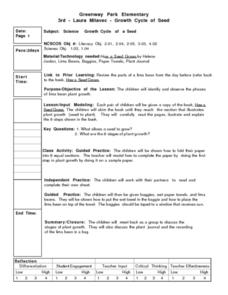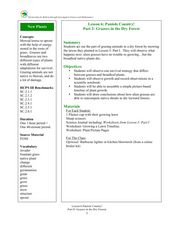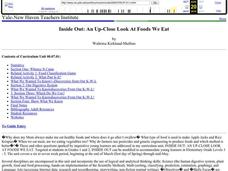Curated OER
NATIVE AMERICANS
Students study the importance of nature to Native Americans and discover the growth stages of Northern beans and mustard seeds.
Curated OER
How Tall are Plants?
First graders measure a plant using unifix cubes and record their measurements on a class chart.
Curated OER
Sowing Seeds of Service
Third graders use metric measuring for model and actual plan in designing a roof garden. They photograph the process, record results in a journal, and plant seedlings in small containers. Finally, 3rd graders complete an acid rain...
Curated OER
Growing Tomatoes
Second graders investigate the growth of tomatoes. They plant grape tomatoes and observe them. They write in a journal and take digital pictures of their tomato plants. They create bar graphs to tally the progress of their plants and...
Curated OER
Plants
Students plant bean seeds and draw pictures of the plants as they grow. They create their own garden, plant the seeds, and keep a journal of their growth.
Curated OER
How Does it Affect Plants?
Students examine the effects of acid rain on plants. They observe the growth of seeds and the health of different plants for a month. They share their findings with the community.
Curated OER
This Is Tree-rific!
Third graders view a clip of the video Backyard Safari, "Trees," and portray the life cycle of a tree. They also view a clip on structures of a tree and draw a diagram of a tree in their science journals.
National Wildlife Federation
Citizen Science to the Rescue!
You don't have to be a scientist or even out of high school to contribute to scientific research. In the 12th instructional activity in the series of 21, scholars use this opportunity to add to the growing body of scientific knowledge...
California Academy of Science
A Day inthe Life of a San Francisco Native Animal
Although the lesson is specifically about the San Francisco Bay area, it's good enough to be adapted to any local region. Children research what the landscape in San Francisco was like prior to settlement, they consider the types of...
Curated OER
Glided Age
Eleventh graders will participate to brainstorm on the overhead, characteristics of an "irresponsible" adult and 5 of a "responsible" one? How do these differ if we apply these to businesses? Working in partners--Create a Code of Ethics...
Curated OER
Lesson Two
Second graders, after assessing why forecasting weather is important, study about temperature and how to read a thermometer. They experiment being able to observe the mercury rising up and down when given a thermometer and cups of cold...
Curated OER
Should Populations in an Ecosystem be Restricted?
Fourth graders experiment to determine how overpopulation effects ecosystems specifically plants. For this ecosystem lesson, 4th graders conduct an ecosystems experiment after listening to Claire Daniel's, Ecosystems. They watch a video,...
Curated OER
Bottle Habitat
In groups of four, students construct aquatic habitats in pop bottles. They create charts and record data from observations over a four week period. Then they graph their data and write explanations for what they observed.
Curated OER
What is an Earthworm Like?
Second graders study earthworms. In this science lesson, 2nd graders observe an earthworm using a magnifying lens, draw pictures of the earthworm, and record their observations.
Curated OER
A Day in the Life of a San Francisco Native Animal
Young scholars write from an animal's perspective. In this writing lesson students explore the landscape of San Francisco prior to the arrival of the explorers. Young scholars research animals indigenous to the area.
Virginia Department of Education
Weather Patterns and Seasonal Changes
Get your class outside to observe their surroundings with a lesson plan highlighting weather patterns and seasonal changes. First, learners take a weather walk to survey how the weather affects animals, people, plants, and trees during...
Curated OER
The Lima Bean
Third graders investigate the life cycle of a seed. The parts of a lima bean are presented as part of a review. They identify the parts of the seed and state different stages as seen in observation. Students also use an illustration to...
Curated OER
Lesson 6: Paniolo Country Grazers in the Dry Forest
Students explore grazing animals in a dry forest. In this science lesson, students act out the role of a grazer in the dry forest. Students cut their growing lawn and observe what happens after being cut. Students explore differences...
Curated OER
George Washington Carver
Learners write three contributions made to society by George Washington Carver. They complete a handout listing the four things plants need to grow.
Curated OER
Inside Out: An Up-Close Look At Foods We Eat
Fourth graders identify the origins of meats and vegetables consumed by humans on a daily basis. They classify foods (meats, dairy products, grains...) and create a food pyramid.
Curated OER
Publishing With Photos!
Students create books with photographs as illustrations. In this book making lesson, students create books for different subjects to accompany what they are learning. They take photographs to match what they have written.
Curated OER
How Much Water Do Plants Need?
Students experiment with the effects of varying amounts of water on household plants. They give different amounts of water to plants and then observe and record the effects.
Curated OER
My Little Seed House
First graders read a story. In this seeds lesson, 1st graders read The Tiny Seed and make their own seed house. Students write down their observations and complete a worksheet.
Curated OER
Readers Who Struggle Can Learn From Wonderful Teacher/Student Created On-Level Reading Projects
Students create their own books. In this book making lesson, students pick a subject and take photographs of it. They use these photographs to write their own story using their sight words.



